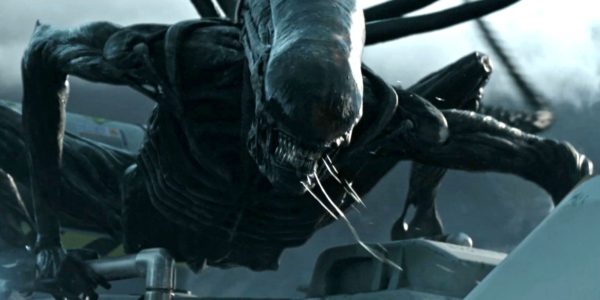Director Ridley Scott has created the most bizarre film of the year. Alien: Covenant is a strange blend of the original 1979 Alien and 2012’s Prometheus, and while it is certainly ambitious, it ultimately feels like a convoluted mess – struggling to find a narrative point.
Alien: Covenant follows the crew of the colonization vessel, the Covenant, as they head for an uncharted world to colonize. As they pick up a distress signal from an unknown origin they change course and investigate the signal, but what they soon find is a dangerous and mysterious world whose sole survivor is the android David from the doomed Prometheus expedition.
“Look on my Works, ye Mighty, and Despair!”
One of Covenant’s biggest issues is its screenplay, which bizarrely manages to come across as both pretentious and confused. The film seems intent on being an ambitious, philosophising film that asks the big questions with exceedingly repetitive and overt references to Shelley, Byron, and Milton (so overt they should have gotten story credits). But at the same time, the film seems to feel obligated to include the xenomorph, as people complained about its absence in Prometheus.

This screenplay confusion leaves the film feeling like its ashamed to be an Alien film. The confusion seems even more evident when then titular creature eventually shows up; its presence feeling tacked on and poorly executed. The xenomorph is shown in broad daylight, the over-exposure of which instantly zaps any potential for tension. Scott even made the peculiar decision to show the xenomorph’s vision; a move which pulls out any of the ambiguity surrounding how the creature perceived its surroundings – something that made the creature scary to begin with.
Destroying any ambiguity that was present in the Alien mythos seems to be Scott’s end goal with his purposed prequel trilogy. Answering the question of the xenomorph’s origin instantly eviscerates any mystery that surrounded the original; a film which primarily relies on the fear of the unknown. It’s as if Scott is hellbent on destroying his own legacy.
“I ought to be thy Adam; but I am rather the fallen angel”
Even with a script as heavily inert as this, Scott’s masterful directing talents still shine through. Technically, Covenant is a breathtaking film with grand sets that are both beautiful and haunting. There is a great sense of the sublime present in the film, as we behold creations that bring out feelings of both disgust and beauty. Wordsworth comes to mind, but the film would rather quote Shelley.
The incredible sets and effects are complimented nicely by Dariusz Wolski’s outstanding cinematography, whose beautifully composed shots only add to the films grandiose scale. All of this is brought together by Jed Kurzel’s surprisingly fantastic score, which blends elements of both Jerry Goldsmith’s original Alien score and Marc Streitenfeld’s criminally underrated score for Prometheus, whilst adding his own haunting themes. Kurzel has certainly redeemed himself from his monotonous score for last year’s Assassins Creed.
The real highlight of this film, however, is Michael Fassbender, whose performance as the androids David and Walter is mesmerizing. Every second he is on screen as David he is entirely engrossing; David’s Shakespearean nature makes for many of the film’s standout moments. His performance as Walter, while not as strong (mainly due to his strange Adam West-style accent), is still fantastic, and the moments when the two androids are on screen together are certainly the best the film has to offer.
Much like every Alien film, Covenant also has its Ripley-like character, played here by Katherine Waterston. The character, Daniels, is probably the blandest out of all the Ripley knockoffs we’ve gotten since Sigourney Weaver’s seminal performance. Daniels has no other attributes other than that she’s headstrong and is an expert on terraforming, something that never comes into use at all in the film. Despite this, Katherine Waterston does her best with what she’s given, and provides us with a somewhat decent performance for a bland character.
Stupid decisions by stupid people
It cannot be stated enough that Covenant’s biggest issue is its screenplay. At once it is both unbelievably stupid and overly pretentious. In the same film, characters quote Percy Shelley and Milton while other characters don’t bother putting helmets on when landing on an unknown planet. It’s truly bizarre.
In the end, the film plays out like a very familiar action sci-fi romp despite all the pondering over mankind’s relationship with god. On top of all this, the film isn’t frightening. The xenomorph just isn’t scary anymore; it doesn’t matter if it’s coming out of someone’s chest, back or throat, it always ends up playing out exactly as we expect it to.
Conclusion
Alien: Covenant had no easy task – it had to be a sequel to the philosophising Prometheus, answering the questions that film left whilst also reintroducing audiences to the xenomorph, a creature that has become somewhat redundant over the past few years. Covenant certainly makes a valiant attempt at this, but in the process becomes completely muddled and uneven. The screenplay is pulled in so many directions that it ends up becoming directionless.
Even with a strong performance from Fassbender and some incredible cinematography under its belt, it is still exceedingly difficult to recommend Alien: Covenant. The inert dialogue and fatuous narrative leave the film feeling rather redundant. All I gained from Covenant was a greater respect for the original film, as it understood that less is more, a rule Scott has seemingly forgot in his endless quest to tell us answers to questions we never asked.
So, what did you think of Alien: Covenant?
Alien: Covenant is in cinemas worldwide.
Does content like this matter to you?
Become a Member and support film journalism. Unlock access to all of Film Inquiry`s great articles. Join a community of like-minded readers who are passionate about cinema - get access to our private members Network, give back to independent filmmakers, and more.